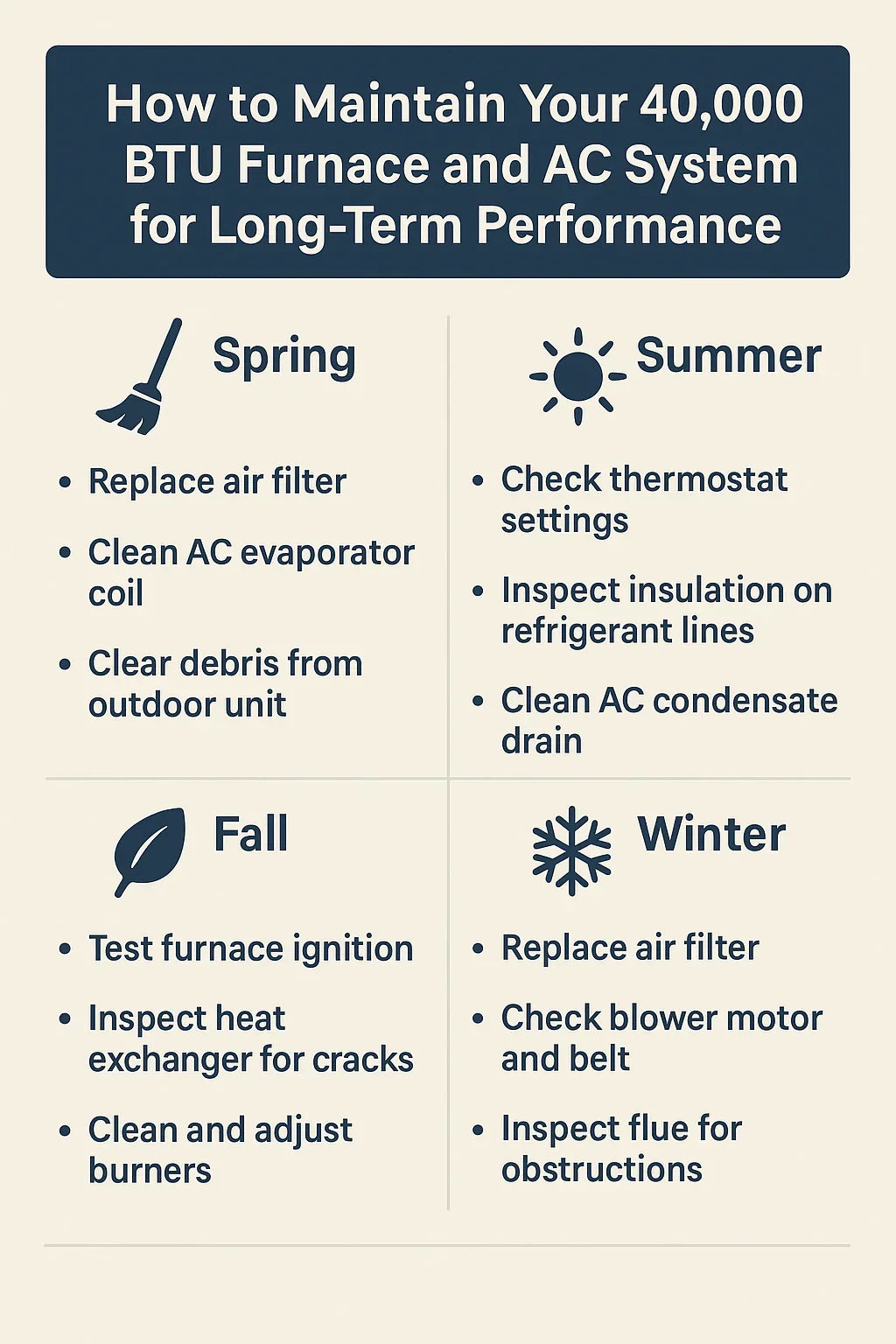Mark Callahan’s Practical Guide to Keeping Your System Efficient and Reliable for Years
🧹 Why Maintenance Matters for Your Furnace and AC
Regular maintenance helps:
-
Extend system lifespan (often 15–20 years with care).
-
Prevent breakdowns during peak heating or cooling.
-
Maintain efficiency, reducing utility bills by 10–15%.
-
Keep warranties valid, as many manufacturers require annual service.
For official guidance, see Energy Star’s HVAC Maintenance Recommendations.
📅 Seasonal Maintenance Schedule
Spring:
-
Inspect and clean AC coils.
-
Check refrigerant lines for leaks or wear.
-
Clear debris around the outdoor unit.
-
Change air filters.
-
Test thermostat.
Summer:
-
Monitor system for airflow consistency.
-
Keep outdoor coils clean.
-
Ensure condensate drain line is clear.
-
Replace filters if visibly dirty.
Fall:
-
Inspect and test furnace ignition system.
-
Check heat exchanger for cracks.
-
Lubricate blower motor if needed.
-
Change air filters.
Winter:
-
Monitor furnace operation for odd sounds or smells.
-
Check thermostat settings.
-
Replace filters monthly if needed.
-
Keep vents unobstructed.
🛠️ DIY Maintenance Tasks You Can Do Safely
✅ Change Air Filters Regularly:
-
Every 1–3 months, or as recommended.
-
Use MERV 8–11 filters for balance of filtration and airflow.
✅ Keep Outdoor Unit Clean:
-
Remove leaves, grass, and debris.
-
Maintain at least 2 feet of clearance around the unit.
✅ Inspect Visible Wiring:
-
Check for fraying or disconnected wires.
-
Turn off power before inspecting.
✅ Clean Condensate Drain Line:
-
Pour a cup of vinegar or bleach down the drain line every 3–6 months to prevent clogs.
For filter selection, see Carrier’s Air Filter Replacement Guide.
🔧 Professional Maintenance Tasks
While Mark can handle many maintenance tasks, hire a licensed HVAC technician annually for:
-
Refrigerant checks and recharging.
-
Combustion analysis and heat exchanger inspection (important for safety).
-
Deep coil cleaning and blower maintenance.
-
Gas line and electrical safety checks.
Annual service helps catch issues before they become expensive repairs. Learn about professional maintenance steps from Trane’s Furnace Maintenance Guide.
❄️ Maintaining the AC Side of Your System
-
Spring startup:
-
Check refrigerant levels.
-
Ensure the outdoor condenser is clean and unobstructed.
-
Inspect insulation on refrigerant lines.
-
-
During use:
-
Listen for unusual noises.
-
Check for reduced airflow.
-
Clean filters regularly.
-
-
Fall shutdown:
-
Turn off the outdoor disconnect.
-
Clean and cover the unit if desired.
-
🔥 Maintaining the Furnace Side of Your System
-
Check and replace filters regularly.
-
Inspect burners and ignition system.
-
Clean the blower assembly if accessible.
-
Ensure vents and flues are clear of obstructions.
-
Test carbon monoxide detectors in your home.
For complete furnace maintenance tips, see Carrier’s Furnace Maintenance Resource.
⚠️ Troubleshooting Common Issues
✅ Weak Airflow:
-
Check filters for clogging.
-
Inspect ducts for blockages.
✅ Unusual Noises:
-
Rattling: loose panels.
-
Screeching: belt issues.
-
Banging: delayed ignition.
✅ AC Not Cooling:
-
Check thermostat settings.
-
Ensure outdoor unit is powered.
-
Check for dirty coils.
✅ Furnace Not Heating:
-
Confirm thermostat mode and temperature.
-
Check circuit breakers.
-
Inspect ignition system.
If unsure, contact a professional to prevent further damage.
🪙 Does Maintenance Save Money?
✅ Efficiency Gains: Clean filters and coils can reduce your system’s workload, lowering energy bills.
✅ Avoid Emergency Repairs: Routine checks can catch small issues before they become costly breakdowns.
✅ Protect Your Warranty: Most manufacturers require proof of maintenance to honor warranties.
The Energy Star HVAC Savings Guide details how maintenance improves efficiency.
✅ Maintenance Tools You’ll Want On Hand
-
Filter subscription service or reminders.
-
Coil cleaning spray.
-
Screwdrivers and basic hand tools.
-
Wet/dry vacuum for drain cleaning.
-
Personal protective equipment for safe handling.
📝 Conclusion
Maintaining your 40,000 BTU furnace and AC system is essential to:
-
Extend its lifespan.
-
Maximize efficiency.
-
Prevent emergency breakdowns.
-
Keep your utility bills lower.
With Mark Callahan’s approach, using a seasonal schedule and splitting DIY vs. pro tasks ensures you get the most from your system for years.
If you need to explore maintenance-compatible filters or upgrade options, visit The Furnace Outlet’s 40,000 BTU Furnace and AC Collection to match your system needs.
In the next topic we will know more about: Will a 40,000 BTU Furnace Fit in My Utility Closet? Space, Clearance, and Noise Considerations







